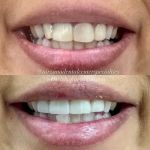- 1-Understanding-Gum-Inflammation-After-Brushing
- 2-Common-Causes-Of-Inflamed-Gums-Post-Brushing
- 3-Immediate-Steps-To-Treat-Inflamed-Gums
- 4-Home-Remedies-For-Soothing-Gum-Inflammation
- 5-Professional-Treatments-And-When-To-See-A-Dentist
- 6-Prevention-Strategies-For-Healthy-Gums
1. Understanding Gum Inflammation After Brushing
Experiencing inflamed gums after brushing can be unsettling, especially when brushing—a daily habit intended to promote oral health—seems to cause discomfort or swelling. Gum inflammation, medically known as gingivitis when mild, is a sign that your gums are irritated, swollen, or even bleeding. It’s crucial to understand that inflamed gums after brushing are often a symptom rather than the root problem itself.
Gums may become tender or inflamed due to several factors, ranging from brushing too hard to underlying gum disease. Many people mistakenly believe that aggressive brushing is beneficial, but harsh brushing can actually damage gum tissue, leading to inflammation. Proper brushing technique combined with gentle care is essential.
Knowing how to treat inflamed gums after brushing involves recognizing the causes, the signs to watch for, and adopting practices that soothe and heal the gums. Through this understanding, you can restore comfort and prevent further oral health issues.
The Role of Oral Hygiene and Gum Sensitivity
Good oral hygiene remains the cornerstone of gum health, yet paradoxically, poor brushing habits may trigger gum inflammation. Sensitive gums are more prone to irritation, especially when exposed to abrasive brushing or certain toothpaste ingredients. Individuals with receding gums or gum disease may notice increased sensitivity post-brushing. Recognizing this connection is the first step to effective treatment.
2. Common Causes of Inflamed Gums Post Brushing
Several factors can lead to gum inflammation after brushing, including:
- Brushing Technique: Using a hard-bristled toothbrush or applying excessive pressure can abrade and irritate gum tissue.
- Incorrect Toothpaste: Some toothpaste formulas contain harsh detergents or allergens that can inflame sensitive gums.
- Gum Disease: Early stages of gingivitis or periodontitis weaken gum tissue, making it more susceptible to inflammation.
- Poor Oral Hygiene: Inadequate plaque removal allows bacteria to build up, triggering gum inflammation and discomfort.
- Recent Dental Work: Procedures like deep cleanings or fillings may temporarily inflame gums.
Understanding these causes can help tailor treatment strategies and avoid further gum irritation.
Case Study: Sarah’s Journey to Healthier Gums
Sarah, a 34-year-old teacher, began noticing persistent gum redness and swelling immediately after brushing. Initially, she brushed more vigorously, thinking it would help. However, the inflammation worsened. After consulting her dentist and adjusting to a softer toothbrush along with switching to a gentle toothpaste, Sarah’s gums gradually healed. Her story highlights the importance of proper care and technique.
3. Immediate Steps to Treat Inflamed Gums
If you experience inflamed gums after brushing, some immediate actions can help reduce discomfort and promote healing:
- Switch to a Soft-Bristled Toothbrush: Gentle brushing minimizes trauma to the gums while effectively cleaning teeth.
- Adjust Brushing Technique: Use light circular motions rather than harsh back-and-forth scrubbing.
- Rinse with Warm Salt Water: A saltwater rinse can reduce bacteria and soothe inflamed tissues.
- Avoid Irritants: Steer clear of mouthwashes with alcohol or strong flavors that might worsen sensitivity.
These steps can provide quick relief and prevent inflammation from escalating.
4. Home Remedies for Soothing Gum Inflammation
Beyond immediate actions, certain home remedies offer natural relief and aid in healing inflamed gums:
- Cold Compress: Applying a cold compress externally on the cheek can reduce swelling and numb pain.
- Aloe Vera Gel: Known for its anti-inflammatory properties, aloe vera applied gently to gums can calm irritation.
- Hydrogen Peroxide Rinse: Diluted hydrogen peroxide rinses help kill bacteria but should be used cautiously and not swallowed.
- Tea Tree Oil: A few drops diluted in water as a rinse may reduce gum inflammation due to its antimicrobial effects.
While home remedies can be effective, it’s important to use them correctly and monitor your symptoms closely.
5. Professional Treatments and When to See a Dentist
Persistent or severe gum inflammation after brushing often requires professional attention. Dentists can assess the condition of your gums and provide targeted treatments such as:
- Professional Cleaning: Removing plaque and tartar buildup beneath the gum line to reduce inflammation.
- Scaling and Root Planing: Deep cleaning procedures to treat early gum disease.
- Prescription Mouthwashes or Antibiotics: To control infection and promote healing.
- Advice on Oral Care Products: Customized recommendations for toothbrushes, toothpaste, and floss tailored to your gum health.
If you notice persistent bleeding, swelling, pain, or if inflammation worsens despite home care, it’s essential to consult a dental professional promptly.
6. Prevention Strategies for Healthy Gums
Preventing gum inflammation after brushing begins with consistent and gentle oral hygiene habits combined with regular dental visits:
- Use the Right Tools: Select a soft-bristled toothbrush and toothpaste formulated for sensitive gums.
- Brush Properly: Employ gentle, circular brushing motions and avoid excessive force.
- Floss Daily: Removing plaque between teeth reduces gum irritation.
- Maintain Regular Dental Check-Ups: Professional cleanings and examinations help detect and address gum issues early.
- Maintain a Healthy Diet: Nutrients like vitamin C and antioxidants support gum health.
Adopting these strategies fosters long-term gum health and reduces the risk of inflammation triggered by brushing.
For those seeking tailored oral care products or professional advice on managing inflamed gums, Dentistry Toothtruth offers a trusted resource to explore effective solutions and find expert guidance to maintain optimal gum health.







 Cherry Valley Dental4.0 (115 review)
Cherry Valley Dental4.0 (115 review) Main Street Dental Group and Orthodontics4.0 (238 review)
Main Street Dental Group and Orthodontics4.0 (238 review) Mountainside Dental Group - Rancho Santa Margarita4.0 (117 review)
Mountainside Dental Group - Rancho Santa Margarita4.0 (117 review) Shahin Shamsian DDS2.0 (17 review)
Shahin Shamsian DDS2.0 (17 review) Gannett Drive Dental4.0 (63 review)
Gannett Drive Dental4.0 (63 review) Daniel Jeffrey Cohen, DDS5.0 (117 review)
Daniel Jeffrey Cohen, DDS5.0 (117 review) The Importance of Oral Health Education During Pregnancy for a Healthy Pregnancy
The Importance of Oral Health Education During Pregnancy for a Healthy Pregnancy Best Tips for Brushing Your Teeth Properly for Healthy Gums: Essential Techniques for Oral Health
Best Tips for Brushing Your Teeth Properly for Healthy Gums: Essential Techniques for Oral Health Why Skipping Dental Checkups Can Lead to Bigger Oral Health Problems
Why Skipping Dental Checkups Can Lead to Bigger Oral Health Problems Advantages of Porcelain Dental Restorations
Advantages of Porcelain Dental Restorations How Can Diabetes Cause Tooth and Gum Problems? Preventing and Managing Oral Health Issues
How Can Diabetes Cause Tooth and Gum Problems? Preventing and Managing Oral Health Issues Healthy Habits for Promoting Good Oral Health and Hygiene: Tips for a Healthy Smile
Healthy Habits for Promoting Good Oral Health and Hygiene: Tips for a Healthy Smile